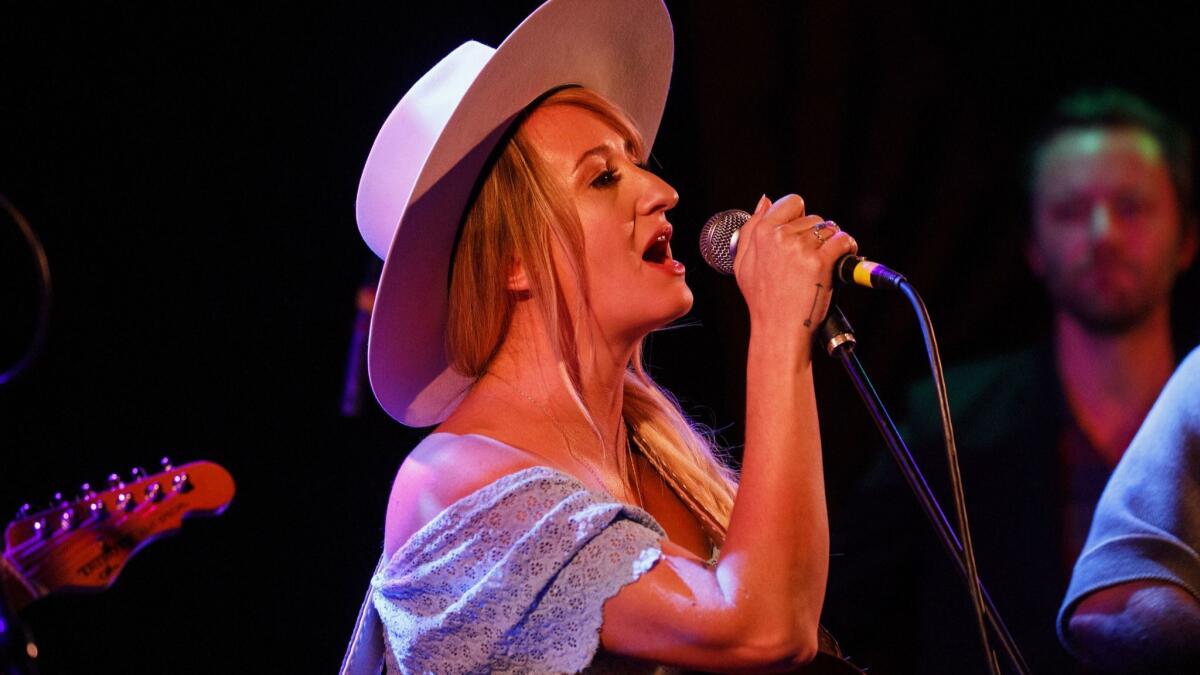Margo Price, nine months pregnant, has a message for male Alabama lawmakers

- Share via
Singer-songwriter Margo Price could hardly be more engaged with issues of pregnancy, childbirth and motherhood. She’s due to deliver her third child any day now — she noted with pride that her due date is Friday, May 24, or as she put it, “Bob Dylan’s birthday.”
All of which places her in a position of special authority as she’s chosen to speak out in protest against Alabama’s new law restricting abortion.
“I don’t understand why men are making laws about women’s bodies,” said Price, who was nominated for best new artist at the 2018 Grammy Awards. “Men have no idea what it’s like to be pregnant, what it’s like to carry a child, how much stress it puts on the body, how much it changes your life.”
Price has teamed with veteran folk-rock singer-songwriter John Prine for a new duet version of his 1984 song “Unwed Fathers,” which takes aim at men’s frequent abdication of responsibility of their role in unplanned pregnancies: “From teenaged lover to unwed mother / Left undercover like some bad dream / But unwed fathers, they can’t be bothered / They run like water, through a mountain stream.”
Prine’s label, Oh Boy Records, will donate proceeds from sales of the single to the Alabama chapter of the American Civil Liberties Union, which has announced it will challenge the law in court.
Despite being at the stage in her own pregnancy where she knows her baby could come at any moment, Price, 36, has not flinched from engaging with a red-hot political issue. “I think it’s very important to speak up for women’s rights,” she said, “especially with what’s going on in Alabama right now.
“It’s just insane that we’re still dealing with issues we thought were settled a long time ago,” she said. “This [new law] makes no exceptions for rape and incest and where women’s lives are on the line.
Price said she first heard “Unwed Fathers” through the 1983 recording by country queen Tammy Wynette, which made the Top 100 of Billboard’s Hot Country chart. She subsequently heard Prine’s original on a cassette compilation of his music that “I was listening to, on repeat, driving back and forth from Illinois to Nashville in my 20s” while working to launch her career as a songwriter and recording artist.

“I love his version,” she said. “We sang it together a lot on the road over the years. It was the perfect choice for the subject matter.”
The B-side will feature a new rendition of Prine’s 1971 Vietnam War-era protest song “Your Flag Decal Won’t Get You Into Heaven Anymore.” Price sings on that one too. “It’s one of my favorites, and a perfect example of how to write a protest song.
“I’ve always admired people like John, Bob Dylan, Joan Baez and Neil Young, who are not afraid to get political,” said Price, who also recently produced a new album from Jessi Colter, Waylon Jennings’ widow. “It’s not to say I’m going to do this on every song or album I write. I know some of the people who listen to my music have turned me off altogether” because of some of her politically charged songs.
“But at the end of the day, at the end of my life, I know I’m going to be fine with the crowd that I have,” she said. “They come to my shows and they’re very open-minded individuals. At the same time, I don’t expect people to agree with everything I say politically. And that’s fine.”
She also noted the template for outspoken songs laid down decades ago by one of her musical heroes, Loretta Lynn, who touched on burdens for women of child-bearing and rearing age in her 1971 hit “One’s On the Way,” and on the song she turned into a revolutionary country hit in 1975, “The Pill.”
“I’ve sung both those songs throughout my pregnancy,” Price said. “Loretta’s definitely been a huge advocate for women’s rights. In fact, several months ago, I was talking to her daughter, Patsy, and asked her about being on the road with her mom when she was a child. Loretta called me the next day and I told her we had chosen ‘Lynn’ as the middle name for our child before we knew [the gender], because it would work for a boy or a girl.”
Follow @RandyLewis2 on Twitter.com
For Classic Rock coverage, join us on Facebook
More to Read
The biggest entertainment stories
Get our big stories about Hollywood, film, television, music, arts, culture and more right in your inbox as soon as they publish.
You may occasionally receive promotional content from the Los Angeles Times.










